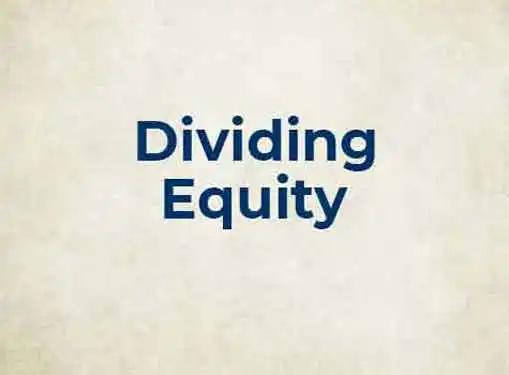Starting Your Business
Dividing Equity Stake
Written by James Garvin for Gaebler Ventures
There are a lot things that happen in the middle from forming your corporation to being bought out and one of the most sensitive and often times most frustrating experiences occur at the very beginning when it comes down to deciding what the equity division will be among founders.
Great, you've convinced your friends to join you in your start-up and to go build your own company that you can one day go sell and make millions of dollars.

It's every entrepreneurs dream and for some, a reality. It is critical that if you are starting a company with friends or family that you do not let friendships dictate equity division. Equity division should be based on hard facts based on the monetary and service contributions made by each individual member now and in the future.
At day 0, your startups business is probably worth close to $0. You may have been putting in some work on building a prototype or conducting market research to validate your ideas, but these are typically non-tangible benefit that can be difficult to assign a value to on day 1 of your company formation. There are two types of contributions that a business partner can make: 1.) Monetary 2.) Service.
On day 0 of your company formation, you will need to put some money in the pot to cover basic expenses. You don't need to put all of your cash in at day 1, rather you can set-up an agreement that certain members will chip in more money when it is needed. Some members may contribute more cash than services, and others more services than cash. How do we delineate what is more valuable so that we can fairly divide the equity stake?
There's no rule of thumb here to dictate the value of service contributions. Monetary contributions are pretty easy as $1 equals $1. You can try to assign an hourly rate to each service hour and write in your contract that each member will contribute no less than 40 hours per week going forward. You can then dictate that each member work a certain number of hours on a go-forward basis.
Whatever method you use to assign service contribution value and who will be contributing what amount of cash and service hours is up to you, but be very clear about what those expectations and requirements are in your incorporation documents so that they are legally binding. Do not ever give equal equity distribution if the monetary and service contributions by each member are not equally distributed.
Legal documents that you create during your startup are drafted to determine what happens during a worst case scenario. Perhaps a founding member decides to quit after 1-year, what should happen to his/her equity stake? The rule of thumb to follow is to use a traditional 4-year vesting schedule so that if a member decides to withdraw before 4 years, they do not retain 100% of the initial equity distribution that was assigned to them. The other preventative measure you can use is a cliff period. The cliff period is usually 1-year after the date of formation that says no member shall retain any equity stake if they withdraw ore are removed from the corporation before one year of the date of incorporation.
Equity distribution is a sensitive topic to discuss especially when starting out and there is little to no value assigned to the corporation, but it is something that should be taken seriously and methodically to ensure that all partners are fully incentivized to contribute what is expected of them today and in the future.
James Garvin began his education studying biotechnology. In recent years he has turned his interest in technology to helping two internet startup companies. The first business was an online personal financial network and the second was an e-marketing platform created to help entrepreneurs demo their web sites. Currently a student at University of California Davis, James is spending his summer incubating two new online businesses and writing about his entrepreneur experiences.
Share this article
Additional Resources for Entrepreneurs

Conversation Board
We greatly appreciate any advice you can provide on this topic. Please contribute your insights on this topic so others can benefit.